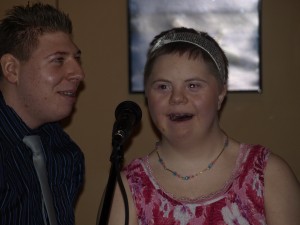| Welcome to “Music Speaks,” the blog of JB Music Therapy. If you’re new here, you may want to subscribe to get new articles easily, join the conversation by commenting on posts, or forward this music message to others who may benefit. |
 I am one of the lucky ones. I found music early (or probably more accurately, it found me). I have played in bands since grade 3, have sung in several musicals starting in grade 5, and participated in endless amount of choirs and vocal ensembles throughout my entire life. These experiences with music gave me a taste for what a powerful connector music can be – but it was not until I witnessed a music therapy group that I saw its true power.
I am one of the lucky ones. I found music early (or probably more accurately, it found me). I have played in bands since grade 3, have sung in several musicals starting in grade 5, and participated in endless amount of choirs and vocal ensembles throughout my entire life. These experiences with music gave me a taste for what a powerful connector music can be – but it was not until I witnessed a music therapy group that I saw its true power.
I heard a lot of sounds, something in-between singing and talking. The voices echoed eerily off the walls. I recognized my own discomfort but Sam’s steady pace and on-going chatter put me at ease. A few feet from the doorway was a small person with blonde curly hair and glasses lying on the floor against the wall. I could not gauge her age but was told later that the group members were in their twenties. She was hitting her head repeatedly against the wall. Sam bent down, touched the girl’s shoulder and said, “Hi Susan.” She immediately stopped hitting her head. He whispered a few words into her ear and tickled her shoulder and she began to laugh. He walked into her room, found a small wheelchair, lifted her into it and asked me to push her while we sought out a few other members. This scenario repeated four more times with Sam walking by a person who had not even noticed we were there until Sam gently touched a shoulder or knee to get their attention. Sam would help each of them to their feet or into a wheelchair. Soon we were a small group heading back through the winding halls to the group room. Once we were gathered I helped Sam make a circle of chairs and wheelchairs. He instructed me to sit in the circle with everyone else. I nodded and felt somewhat more comfortable than I did before. I looked at all the individuals sitting around the room. They were different sizes and shapes. Some wore glasses and others squinted. Many looked like mobility was not a prime concern. Some were not able to sit up properly and needed pillows to be reasonably comfortable. Once everyone was settled, he opened his guitar case and put the strap around the back of his neck. A quick tune, then a strum, and then a moment of silence. Heads lifted and their attention peaked. A small giggle escaped Susan. It was in the moment of the first few notes and chords that I saw a transformation in the small faces that just moments ago had held vacant stares, silence, or in Susan’s case, the violence of hitting her head against the wall. Legs started to swing, heads started to bob, and chins went back. Mouths opened and sounds started to escape from a few patients. Some even sang the words while others tapped the tray on their wheelchair. Sam was still smiling and I realized my toes had started tapping. (EXCERPT from TUNE IN)
Making music together and singing in particular makes us feel more connected – and there is a scientific reason for that: A study by Grape et al. examined the beneficial effects of singing upon the overall well-being amongst trained and untrained singers. Both groups of singers demonstrated an increase in oxytocin levels after singing. Oxytocin is the “connector hormone” since it is known to be released after a sensual encounter with a loved one and quickly boosts feelings of trust, reduces stress and promotes feelings of happiness. When we sing we are happier and can more easily cope with the stress in our lives.
An exploratory study by Clift and Hancox collected information from students in a university choir about the perceived personal and health benefits that could result from making music together.
87% percent of the students responded positively in believing that they benefited socially
75% believed that they benefitted emotionally
58% thought that they benefitted physically
22% of the students believed that they experienced reduced stress and anxiety
If music can work for the kids that Sam works with, and for stressed out university students then what can music do for you?
Music = Cheap Health Care
__________________________________________________
 Jennifer Buchanan, BMT, MTA is the happy owner of JB Music Therapy and Author of TUNE IN. Our “Music Speaks” Blog aims to inspire you to use music with greater intention and knowledge. Call us to help or and browse our resources here.
Jennifer Buchanan, BMT, MTA is the happy owner of JB Music Therapy and Author of TUNE IN. Our “Music Speaks” Blog aims to inspire you to use music with greater intention and knowledge. Call us to help or and browse our resources here.
